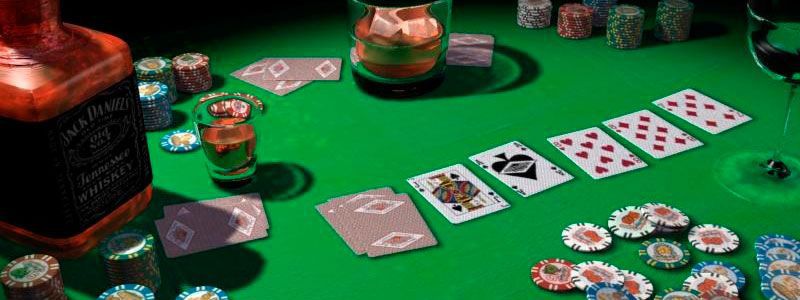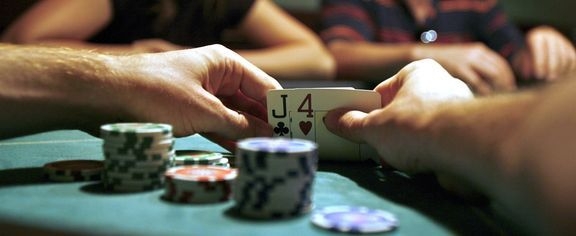Tips on postflop play from psychological point of view. Part 3

We continue to speak about basic principles of postflop play. In two previous articles ('Tips on postflop play from psychological point of view. Part 1' and 'A little bit more about postflop play in poker') we had a look at eight fundamental strategic concepts. We will have a look at some other concepts in this article.
IX. Keep an eye on the aggression level of players to your left
This factor will often help you to choose optimal strategy play. There are incredibly many articles about this but players keep ignoring this thesis, especially in multi-pots.
Imagine, you make a small bet, of half a pot, for example, and after that glance at the neighbor to you left and get all-in from him.
By losing several half-pot bets during the session, you may sufficiently worsen the result of your game.
X. In some cases new cards on the board decrease value of made hands
It is obvious but many players forget this simple conception in the process of playing the hand. There is no exact data for this, but everybody sees that most of the chips are lost by the beginners in postflop battles with hands like top pair top kicker and two pair. Players don’t pay much attention to the board texture, they see that they have what they think is a strong hand and ready to play for stack with it. They do this especially often with hands like pocket Kings ( ) or pocket Aces ( ) and explain it with the fact they had to continue aggression after they’ve made raise with these hands preflop.
Just remember that these poker combinations are vulnerable as they rarely improve. On the other hand, there are many combinations, which are trying to get additional outs in the postflop play. If that happens, made hands suffer.
Don’t get too committed to the hand that used to be strong on the flop. Remember that every new card on the board decreases your relative strength of the hand.
Ponder every situation. Try to count the probability of you hand still being ahead. Pay attention at the speed of your opponent is making decisions with different hand types. Don’t get over committed to the hand. Don’t be afraid to fold Aces on the scary board. It is possible that flop structure, position and opponents’ actions scream about you are beaten.
XI. Avoid problematic situations and marginal hands
Key factors in time of playing any hand are the position at the table and the actions of the opponents before you. If you decided to make your life a living hell, go ahead and limp from early positions with hands like K9 and A6. And don’t say that they are of the same suit!
These are problematic hands. They look good and have a potential to become a good combination on the flop. The problem is in probabilities. Sometimes you will get a strong hand but your hand will be second best in most cases. In result, your rare wins won’t compensate your losses in those more common situations. Here is the example of the hand we saw (or not!): the player limps from the middle position with , get raised by the passive player on BU and calls this raise (without showing too much enthusiasm, of course).
Flop is . The opponent bets half the pot, Hero calls. Turn is - . One more half-pot bet and call. River is blank. Villain bets and gets a fast call in response. BB shows .
Let’s analyze this hand to find the reasons of loosing such a big bot.
Starting limp doesn’t look awful. This line gives you an opportunity to see the cheap flop. Problems begin with the raise preflop.
Firstly, hero calls the raise, then he hits the board and calls the continuation bet. In result, he loses several bets.
Why will many players call on all three streets? Basically, this is the situation which is called 'effect of previous investments' by the economists. That means that previous investments provoke new investments from you.
This is like being pot committed. In our case, though we can’ say that the player is committed on the flop or preflop.

However, previous investments into the hand, that had some showdown value and outs to improve, give him a strong emotional wish to continue playing the hand. This is partly connected with psychological tendency of a man to expect results higher than they should be.
That way being under the 'effect of previous investments', players begin to overvalue potential profits.
Jackson and Dickson of the Southern Illinois University studied this effect in Hold'em. Studies of Dickson are dedicated to psychological factors between choice, self-control and gambling.
Problems of this type are relevant for those who participate in economical and financial processes so don’t be surprised poker players face them all the time.
Too loose players like to play the hands of this type hoping for the good flop and winning a big pot (two pairs with A9 can get a pile of chips from AK).
That way, one could say that big reward makes a serious impact on our emotions and defines the approach to our game in many aspects. But the basic poker theory estimates such hand as -EV play from our side. What’s worse, those hands suffer from the lack of information. As a rule, it’s difficult to understand how good are your cards are as the opponent’s range in the limp pot is wide. Besides, you will have to play postflop without position and that’s not easy.
You will save your nerve cells and tons of chips throwing hands like this away. Even the best players don’t play them profitably. By getting rid of these hands preflop you won’t get in trouble in postflop game.
Knowledge base's sections
The best about poker
- How to get satisfaction from playing poker
The psychology of poker
- Five reasons why I've made money and continue doing this playing poker
The psychology of poker
- Poker table positions (positions in poker)
Fundamentals of poker
- The fundamental theorem of poker
Poker theorems
- Slow play in poker
Fundamentals of poker
- The probabilities of getting specific starting hands on preflop
Poker mathematics
 pokerglobal
pokerglobal

Comments (0)